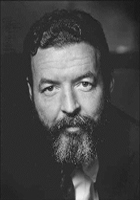Children Selecting Books In A Library Poem by Randall Jarrell
Children Selecting Books In A Library
With beasts and gods, above, the wall is bright.
The child's head, bent to the book-colored shelves,
Is slow and sidelong and food-gathering,
Moving in blind grace ... yet from the mural, Care
The grey-eyed one, fishing the morning mist,
Seizes the baby hero by the hair
And whispers, in the tongue of gods and children,
Words of a doom as ecumenical as dawn
But blanched like dawn, with dew.
The children's cries
Are to men the cries of crickets, dense with warmth
-- But dip a finger into Fafnir, taste it,
And all their words are plain as chance and pain.
Their tales are full of sorcerers and ogres
Because their lives are: the capricious infinite
That, like parents, no one has yet escaped
Except by luck or magic; and since strength
And wit are useless, be kind or stupid, wait
Some power's gratitude, the tide of things.
Read meanwhile ... hunt among the shelves, as dogs do, grasses,
And find one cure for Everychild's diseases
Beginning: Once upon a time there was
A wolf that fed, a mouse that warned, a bear that rode
A boy. Us men, alas! wolves, mice, bears bore.
And yet wolves, mice, bears, children, gods and men
In slow preambulation up and down the shelves
Of the universe are seeking ... who knows except themselves?
What some escape to, some escape: if we find Swann's
Way better than our own, an trudge on at the back
Of the north wind to -- to -- somewhere east
Of the sun, west of the moon, it is because we live
By trading another's sorrow for our own; another's
Impossibilities, still unbelieved in, for our own ...
"I am myself still?" For a little while, forget:
The world's selves cure that short disease, myself,
And we see bending to us, dewy-eyed, the great
CHANGE, dear to all things not to themselves endeared.
This poem has not been translated into any other language yet.
I would like to translate this poem
RANDALL JARRELL - CHILDREN SELECTING BOOKS IN A LIBRARY This poem is a wonderful example of a poet setting a scene with simple words, briefly showing us a child browsing along a shelf of books, in a library where the walls are decorated with murals of beasts and gods from classical literature. However, we are soon in the land of mystical poetry - the child is 'food-gathering' (he needs knowledge and nourishment from his reading) , but quite soon 'Care the grey-eyed one' appears, bringing with her some of the sad and tragic side of that knowledge. The only short line in the poem - 'The children's cries' emphasizes the importance of the next step into the poem - the reaction of adults to children's questions; they find them distracting, perhaps, but touching. At this point the poet plunges into the fund of myth and classical knowledge which makes his work richly-layered with meaning. The adults are invited to 'dip a finger into Fafnir' so that they can understand how a child's mind develops. He assumes that if the reader knows who Fafnir was, or if he is interested enough to look him up, his knowledge will be increased and the richness of the content of his poem will also be widened. (Fafnir in fact was an evil man in Norse mythology who killed his father to obtain much gold - and thereafter turned into a dragon guarding a treasure - a frequent symbol in myth) . He then discusses why the children's tales 'are full of sorcerers and ogres ' - the simple solution is 'because their lives are': they have to face tragedies in life, and the only comfort is that in time 'the tide of things' may help them.'Meanwhile' reading will extend knowledge. The poet then gives examples of the best way for children to deepen their understanding of life - beginning with 'once upon a time'..., the first stage in 'escaping' from everyday life, and continuing travelling in fiction of various kinds - with Proust in 'Swann's Way' ' or exploring 'the back of the north wind' or 'somewhere east of the sun, west of the moon' (both references to another book, and a song) - by sharing another's experiences and forgetting one's own sorrows. You forget yourself and realise the healing power of CHANGE! (his capitals) . This poem takes us through a tightly- reasoned explanation of the importance of reading, and books in general. The language may seem difficult at times, but it is interesting to note that the shape of the poem is like a Shakespearean soliloquy - in the same iambic pentameter blank verse scheme, with a few irregular lines to emphasize changes of tempo. Just as Shakespeare used this form to convey intimate thoughts of his characters to his audience, Jarrell has compressed in this poem many ideas about childhood and the importance of books in the life of people generally.